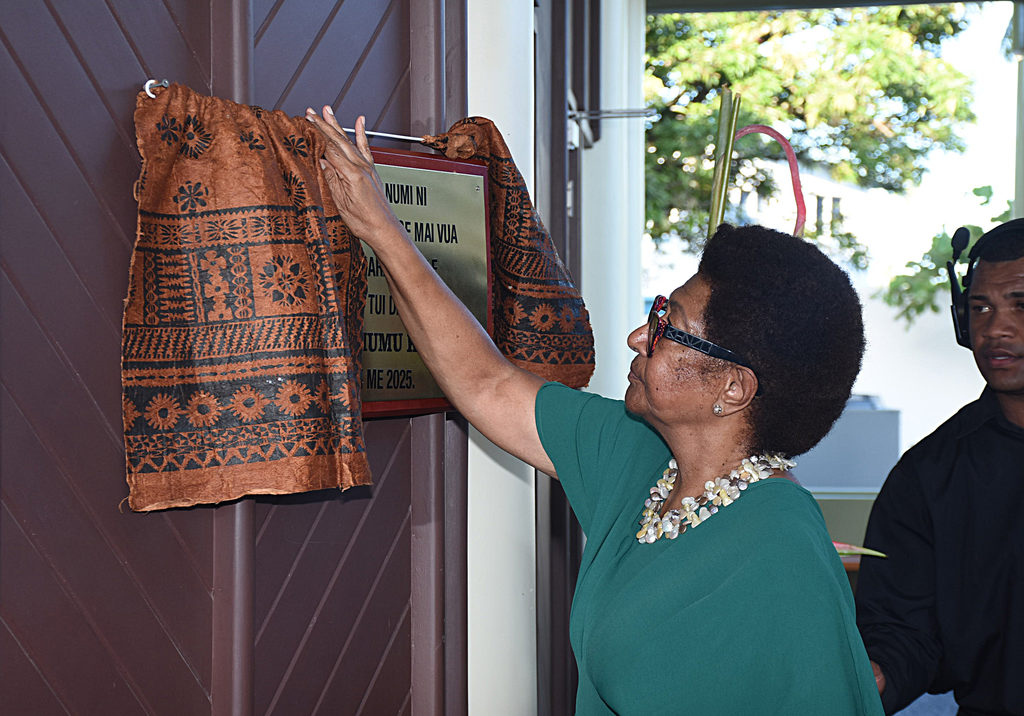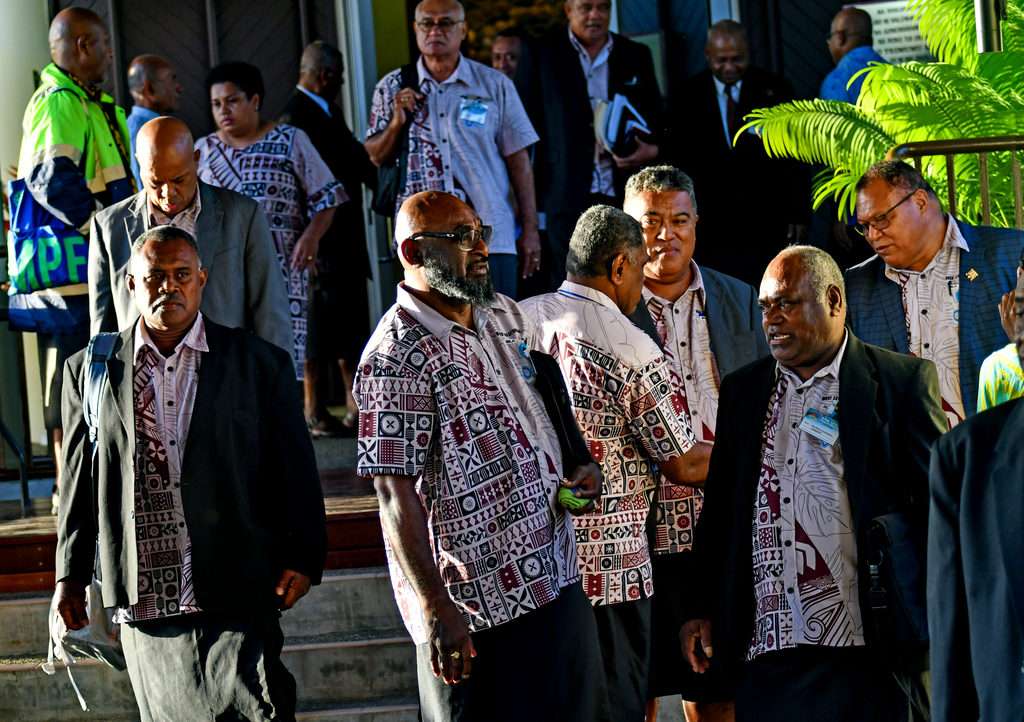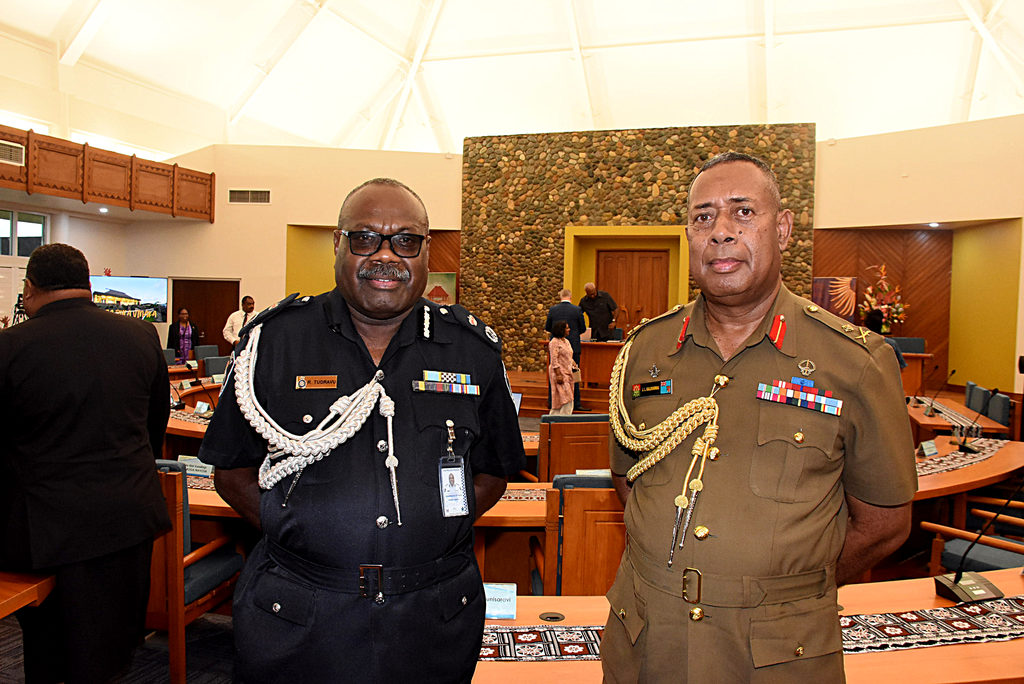Like a phoenix rising from the ashes, the Great Council of Chiefs (GCC) made its symbolic return this week to the newly-redeveloped Bose Levu Vakaturaga complex in Nasese — more than a decade since the council was cast into silence.
It is the first meeting held at the sacred site since the 2019 blaze that reduced the old complex to ashes, and the council’s reinstatement in 2023. For many, the return signalled more than just a change in venue, it marked a homecoming.
“When the complex burnt down in 2019, I had released a statement of how symbolic the inferno was,” said the Marama Bale Na Roko Tui Dreketi and paramount chief of the Burebasaga Confederacy Ro Teimumu Kepa.
“The former military regime disbanded the GCC and a fire razed their Vale ni Bose to the ground.
“However, we see that God’s plan prevails, and today, we open the new Vale ni Bose — the phoenix that has risen from the ashes.”
Her words echoed across the newly-built structure, which stands on the same footprint as the original but rises with a renewed purpose and a $6.5million price tag fully funded from insurance claims following the 2019 fire.
A bold return and a loaded agenda
With the scent of fresh timber still in the air, GCC chairman Ratu Viliame Seruvakula opened the council’s first 2025 meeting, stating, “This is a temporary setup, beautifully prepared by the iTaukei Trust Fund to enable us to meet.”
Much of the first day was spent deliberating over the long-overdue review of the Native Lands and Fisheries Commission Act — its first comprehensive update in nearly 120 years. Complex discussions took centre stage, particularly issues related to the Vola ni Kawa Bula (VKB) and the controversial 60 per cent threshold for mataqali decisions.
The Constitution, however, proved to be the most compelling point of discussion on the second day of deliberations.
“The consensus from the GCC is clear: they want the current Constitution gone,” said Ratu Viliame.
“They’ve had enough.
“Wherever we turn to try and improve lives, the Constitution is an obstacle.”
He noted the GCC will await the outcome of an ongoing Supreme Court challenge, but made no secret of a Plan B.
“Some chiefs feel that since the Constitution came in through the back door, it should go out the same way,” he said.
A new subcommittee, three chiefs from each of the three confederacies, has been tasked with exploring next steps should the court ruling not meet expectations.
“We’re not looking to replace the entire Constitution, just the parts that hinder iTaukei progress,” Ratu Viliame said.
Building unity, brick by brick
While the Constitution dominated headlines, the council’s undercurrent was unity, a concept personified by the recent appointment of two new deputy chairpersons from the Tovata and Burebasaga confederacies.
“This is important for operational reasons,” Ratu Viliame explained.
“When I’m unavailable, protocol requires a representative. Now, with two deputies, we ensure better representation … and reflect the rotational and inclusive nature of the GCC.”
The chairman also celebrated the growing camaraderie among the chiefs:
“Now, we see more dialogue and idea-sharing. That’s essential.”
Funding: Independent, not invisible
Questions over transparency in funding have surfaced as the GCC ramps up its operations.
The iTaukei Trust Fund Board (TTFB) remains the sole financier of GCC activities.
Its annual financial reports are presented only to the council, not Parliament.
“These are not public funds.
“They are earned from investment portfolios owned by the TTFB in Fiji and abroad.”
As of 2022, the fund’s estimated value stood at over $250million.
While exact investment details remain confidential, officials cited a diverse and high-performing portfolio managed under the leadership of CEO Aisake Taito.
The budget for this current GCC sitting was approved in January, with a second sitting’s budget to be set in June.
No other funding, neither government allocations nor external donors are involved.
“The GCC wishes to remain independent of the Government. This would mean that it will not rely on funding from the Government to conduct its operation.”
The council has also hinted at potential future funding options, including establishing a separate trust fund, but noted, “only time will tell if and when that will happen”.
Beyond the walls: Language, legacy,
and leadership
In between heavy policy debates, the chiefs are also laying cultural foundations.
Queen Victoria School has been tapped as a pilot institution for traditional leadership training, and the newly-established Fijian Language Commission will push for compulsory language instruction from Year 1 to 3 across all schools.
“Many children today cannot read the Bible in Fijian,” Ratu Viliame said.
“This is a serious concern.”
Elsewhere, the council reaffirmed oversight of the Ratu Sukuna Memorial School, once neglected because of the council’s dormancy, and discussed Indigenous shareholding in Fiji Pine.
As for the building itself, questions remain.
While $6.5million was allocated from insurance, works are still in progress, and final cost breakdowns, including construction, project management, and furnishings, have yet to be fully confirmed.
Whether the complex will host other iTaukei institutions or remain exclusive to GCC gatherings is still to be decided.
“We are not toothless”
Amid online criticism over the costs of rebuilding and reactivating the GCC, Ratu Viliame is unequivocal:
“To those who say the GCC is toothless — that’s nonsense.
“We represent nearly 60 per cent of the population.
“We’ve only restarted last year and are currently laying the foundation.
“By this time next year, you will see us more established and making an impact.
As the newly-redeveloped complex hums with renewed purpose, Fiji’s traditional leaders are reclaiming more than just a building, they are reclaiming their voice.
“The chiefs must be functional and relevant,” said Ro Teimumu.
“They must be educated.
“They must be spiritually grounded, enabling them to be the servant leaders the Lord calls us to be.
“Chiefs must seek the wisdom of Solomon, who in 1 Kings 3:9 asked the Lord for a ‘discerning heart’ to govern His people and to distinguish between right and wrong.”
She stressed the need for structured training and support, noting that the GCC must lead efforts to bridge the 16-year gap left in the iTaukei way of life.
“How do chiefs respond to the drug epidemic, rising HIV/AIDS cases, violence against women and children, mental health challenges, teenage pregnancies, and homelessness — all areas where iTaukei are disproportionately affected?
“They cannot do this alone.
“They need proper training, and time is of the essence.”
From the ashes of silence, the Bose Levu Vakaturaga rises anew — steadfast and resolute, ready to shape the future with the wisdom of its ancestors.
Marama Bale na Roko Tui Dreketi Ro Teimumu Kepa unveils the plaque to officially open the Vale ni Bose in Nasese, Suva last Tuesday. Picture: KATA KOLI

Members of the Great Council of Chiefs outside the meeting venue. Picture: ELIKI NUKUTABU



